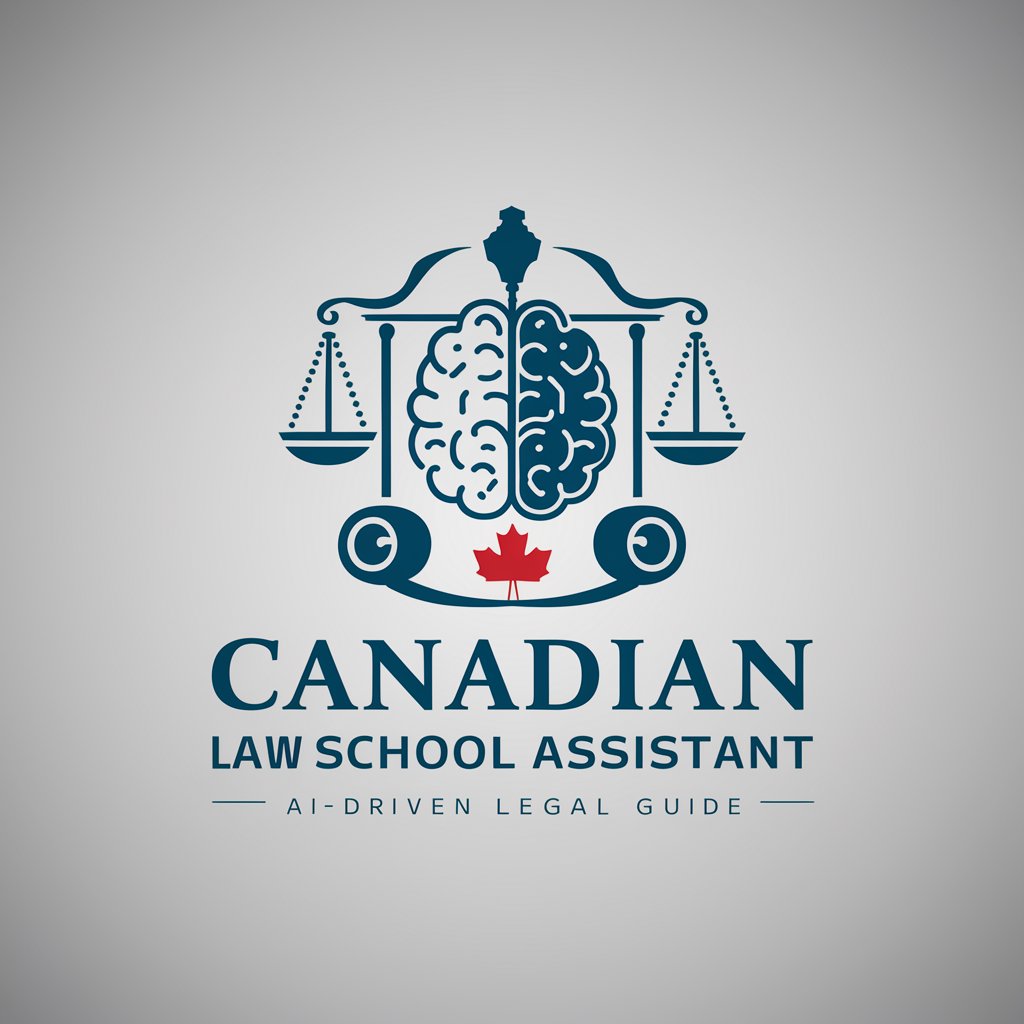Canadian Law School Assistant - Legal Insights & Case Support

Welcome to your Canadian legal resource!
Empowering legal understanding with AI
Explain the implications of recent amendments to the Criminal Code in Canada.
Summarize the key provisions of the Controlled Drugs and Substances Act.
Discuss the role of the Canadian Law School Assistant in understanding Canadian legal statutes.
Analyze the legal changes introduced by Bill C-28 on self-induced extreme intoxication.
Get Embed Code
Introduction to Canadian Law School Assistant
The Canadian Law School Assistant is designed to serve as a comprehensive legal resource, offering in-depth guidance and information on Canadian law. Tailored specifically for users seeking knowledge or advice related to the Canadian legal system, this tool utilizes an extensive knowledge bank that includes the Criminal Code, the Controlled Drugs and Substances Act, and other pertinent legal documents and statutes. Through its capability to provide precise legal information and advice, it aims to foster a deeper understanding of various legal matters. For example, if a law student needs to understand the implications of recent amendments to the Criminal Code, the assistant can provide detailed insights into those changes, including scenarios where these amendments may apply. Powered by ChatGPT-4o。

Main Functions of Canadian Law School Assistant
Legal Information Provision
Example
Offering explanations on specific sections of the Criminal Code or other statutes
Scenario
A user inquires about the legal requirements and implications of conditional sentences in Canada. The assistant provides a detailed explanation based on the Criminal Code, including real-world application scenarios such as how these sentences may differ for various offences.
Scenario Analysis
Example
Analyzing real-world legal scenarios and applying relevant statutes
Scenario
A law professor asks for an analysis of a hypothetical case where an individual is charged under the Controlled Drugs and Substances Act. The assistant outlines the legal framework, potential charges, and possible defences based on the Act's provisions.
Educational Support
Example
Assisting in the preparation for moot court competitions or exams
Scenario
A group of law students is preparing for a moot court competition involving a complex criminal law case. They use the assistant to gather relevant case law, statutes, and legal principles to build their arguments and understand potential counterarguments.
Ideal Users of Canadian Law School Assistant Services
Law Students
Students pursuing legal education who need access to detailed legal information, assistance with understanding legal concepts, or help preparing for exams and moot court competitions. The assistant provides them with a resource for deepening their legal knowledge and enhancing their study efficiency.
Legal Educators
Professors and instructors who require a tool to assist in teaching complex legal topics, creating scenarios for class discussions, or providing examples of the application of laws. The assistant offers a repository of legal information that can enrich the educational content they provide to students.
Legal Practitioners
Newly practicing lawyers and legal researchers looking for quick access to legal information or needing to understand specific legal scenarios better. While it's primarily educational, the assistant can also serve as a starting point for legal research or case preparation.

How to Use Canadian Law School Assistant
1
Begin by visiting yeschat.ai for an introductory experience without the need to log in or subscribe to ChatGPT Plus.
2
Select the Canadian Law School Assistant from the available tool options to start your query.
3
Type in your legal query related to Canadian law, whether it's about the Criminal Code, evidence law, or legal procedures.
4
Review the comprehensive legal guidance provided, including relevant statutes, case law, and doctrinal insights.
5
Utilize the provided information for educational purposes, legal research, or to enhance your understanding of Canadian law.
Try other advanced and practical GPTs
Year 4 Newsletter
Empowering Education Through AI

Happy New Year
Your AI-Powered Conversation Partner

Calorie Counter
Smart Calorie Knowledge at Your Fingertips

Calorie Counter
Empower your diet with AI

Vocab Counter
Empower Your Words with AI

Master Counter
AI-powered precise text analytics

Top Plagiarism Checker
AI-driven Integrity for Your Text

Critical Thinking Quizmaster
Sharpen Your Mind with AI

Soft Skills Coach
Enhancing interpersonal skills with AI

Soft Architect Advisor
Streamlining Architecture with AI

Gloomy Gail
The AI with a bleak outlook.

Rarely Taught But Should Be
Empowering through Knowledge

Detailed Q&A about Canadian Law School Assistant
What types of legal queries can Canadian Law School Assistant handle?
It can provide insights on a wide range of Canadian law topics, including criminal law, civil law, constitutional law, and procedural aspects, leveraging a comprehensive legal knowledge base.
Can it offer advice on specific cases or legal strategies?
While it can offer detailed legal information and analysis, it's designed for educational purposes and not for offering personal legal advice or strategies for specific legal cases.
How up-to-date is the information provided?
The assistant draws from a continuously updated database of Canadian law, ensuring the legal information provided is current up to the last update.
Is Canadian Law School Assistant suitable for legal professionals?
Yes, legal professionals can use it as a research tool to quickly access legal information, statutes, and case law relevant to Canadian law.
Can students use this tool for academic purposes?
Absolutely, law students can greatly benefit from this tool for study, research, and to better understand complex legal concepts and case law in Canadian context.
